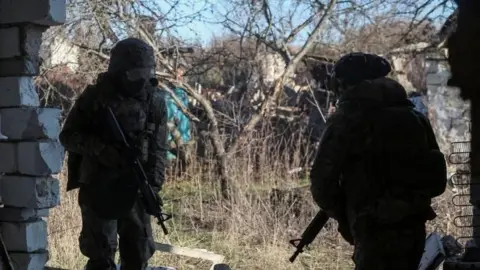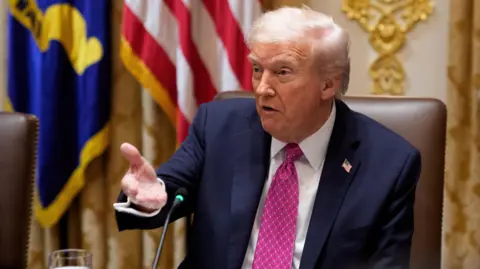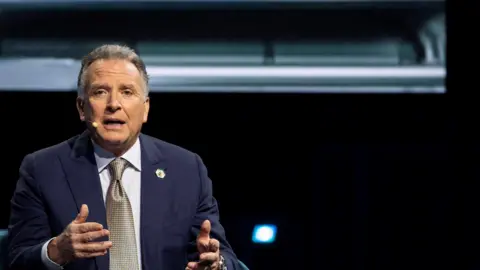Paul AdamsDiplomatic correspondent
 Reuters
ReutersAre we any closer to peace in Ukraine?
After a frantic, often confusing few days of diplomacy, Donald Trump seems to think so.
“We’re getting very close to a deal,” he told reporters on Tuesday.
For his part, Ukraine’s President, Volodymyr Zelensky, who had looked and sounded grim over the weekend, said there were now “many prospects that can make the path to peace real”.
“There are significant results,” he said, after reviewing the results of Sunday’s key discussions in Geneva, “and there is still much work to be done.”
But from the Russians, apart from some discontented mutterings about European involvement and unauthorised leaks, the response has been somewhat muted.
Kremlin aide Yuri Ushakov said on Wednesday that Moscow viewed some elements of the latest draft positively but “many require special discussions among experts”.
Separately, President Vladimir Putin’s spokesman, Dmitry Peskov, said it was “premature” to think that a deal was close.
Last Wednesday already seems like aeons ago. That is when a leaked draft of a 28-point US plan to end the war first emerged.
The plan, whose references to Ukraine giving up territory and limiting the size of its military led some to describe it as a “Russian wish list”, caused consternation in Kyiv and sent European diplomats scrambling to limit the perceived damage.
In some ways, it felt like a re-run of events in August, when anxious European leaders rushed to Washington to bend Trump’s ear after the American president rolled out the red carpet to Putin in Alaska.
By the weekend, the Europeans had drafted a counter-proposal, also 28 points long, which replaced the blunt territorial concessions of the US plan with “negotiations on territorial swaps” and stiffened the language on security guarantees, a key concern of Kyiv.
But how much influence the Europeans had over Sunday’s talks in Geneva remains unclear.
A joint US-Ukrainian statement, issued after the talks wrapped up, spoke of “highly productive” discussions, saying any future agreement must deliver a “sustainable and just peace”.
Sir Keir Starmer was one of several European leaders who seized on the words “sustainable and just” as indicating that progress had been made.
Ukrainian officials sounded relieved too. The First Deputy Foreign Minister, Sergiy Kyslytsya, said the latest version of the plan had been slimmed down to just 19 points, with the most contentious issues – territory and Ukraine’s future relations with Nato – put off for Trump and Zelensky to decide.
Amid recriminations over how the original 28-point version had been leaked (with fingers pointing in multiple directions), a tight veil of secrecy has been drawn around the latest version.
Despite talks in Abu Dhabi involving the US army secretary, Dan Driscoll (a new addition to Trump’s Ukraine team), Ukraine’s military intelligence chief, Kyrylo Budanov, and Russian officials, Ushakov says the plan has still not been discussed in detail.
With Trump’s envoy Steve Witkoff due in Moscow next week and talk of Zelensky paying another visit to the White House, it seems the pace of diplomacy is not about to let up.
 EPA
EPABut where are we?
“We are now on a fast track to something,” says Daniel Fried, former US assistant secretary of state for European and Eurasian affairs.
“To a failure or a fast track to a success, I can’t say, but it’s moving fast.”
Ambassador Fried says last week’s 28-point US plan was a “hot mess” but that the impetus behind it is real.
“To the Trump administration’s credit, it’s pushing hard for a settlement.”
The sense of dread which settled over Kyiv last week – which caused Zelensky to observe that Ukraine was facing one of the most difficult moments in its history – has lifted.
“In Geneva, Ukraine’s delegation was very satisfied,” says Myroslava Gongadze, a non-resident senior fellow at the Atlantic Council’s Eurasia Center, speaking from Kyiv.
“The point of the exercise was not exactly to make an agreement but to throw out that 28-point plan and put some Ukrainian interest in that possible negotiation and show that Ukraine is really willing to discuss and negotiate.”
But if Kyiv feels it has successfully countered some of the worst of what was being demanded – and we still do not know how much – there are plenty of lingering concerns.
Chief among them: what sort of security guarantees can it expect to receive if it finally strikes a deal with the country that launched an unprovoked invasion of its territory and still seems to covet more?
“The essential question we must ask here is security guarantees,” says Gongadze. “Who will be giving those guarantees, who is being held accountable and which border would not be violated?
“If the answers are weak, then it’s setting up Ukraine for another crisis.”
 Reuters
ReutersIn response to the original US document’s rather vague promise to offer “reliable security guarantees”, European leaders spoke of a US guarantee that “mirrors Article 5”, a reference to Nato’s principle of collective defence.
Last week, the Axios news website reported the existence of a separate US paper, presented to Ukraine, which outlines “security assurance modelled on the principles of Article 5 of the North Atlantic Treaty, adapted to the circumstances of this conflict”.
This critical aspect of the plan is clearly still a work in progress. Following Tuesday’s virtual meeting of the UK-French led Coalition of the Willing, participants agreed with the US Secretary of State, Marco Rubio, to “accelerate joint work with the United States to take forward the planning on security guarantees”.
Sir Keir Starmer says operational plans for a multinational “reassurance force” for Ukraine are fully formed but until the Trump administration indicates what, if any, backup it is willing to provide, those plans remain largely theoretical.
“Security guarantees are going to have to be fleshed out,” says Ambassador Fried.
“The Coalition of the Willing is a great idea, but it hasn’t landed on any result to date, partly because they are waiting to see whether the Americans will back them and partly because they’re waiting to see what they’re going into.”
Where we are on territory is another big unknown.
Last week’s 28-point plan stated, bluntly, that Crimea, Luhansk and Donetsk would be “recognised as de facto Russian”, and that Ukrainian forces would withdraw from the heavily contested parts of the Donetsk region still under Kyiv’s control.
All this language vanished in the European counter-proposal. Ukraine, it said, would commit “not to recover its occupied sovereign territory through military means”. All territorial negotiations, it said, would “start from the Line of Contact” – the current front lines.
It is not known the extent to which Europe’s approach informed the document that emerged after the talks in Geneva.
The joint US-Ukrainian communique offered only an oblique insight, saying the two sides “reaffirmed that any future agreement must fully uphold Ukraine’s sovereignty”.
The word “fully” appeared to be carrying a lot of weight.
Given Trump’s mercurial approach to the war in Ukraine, Putin’s lingering ambitions and Zelensky’s domestic difficulties – the current round of diplomacy takes place in the midst of a corruption scandal that is undermining his domestic standing – it is extremely difficult to know where this process goes next.
But it might be overly optimistic to think we are near the end.
“We’re still in the middle of this process,” says Leslie Shedd, another of the Atlantic Council’s non-resident fellows.
“There’s certainly a long way to go still.”
But for all the apparent chaos surrounding the Trump administration’s efforts, including a constantly shifting – and possibly competing – cast of characters, Shedd believes the administration is serious.
“It appears that the president… [is] truly prioritising finding a peace in Ukraine. And I think that is actually really important.”
www.bbc.com (Article Sourced Website)
#Russia #Ukraine #war #peace #stands #frantic #diplomacy

